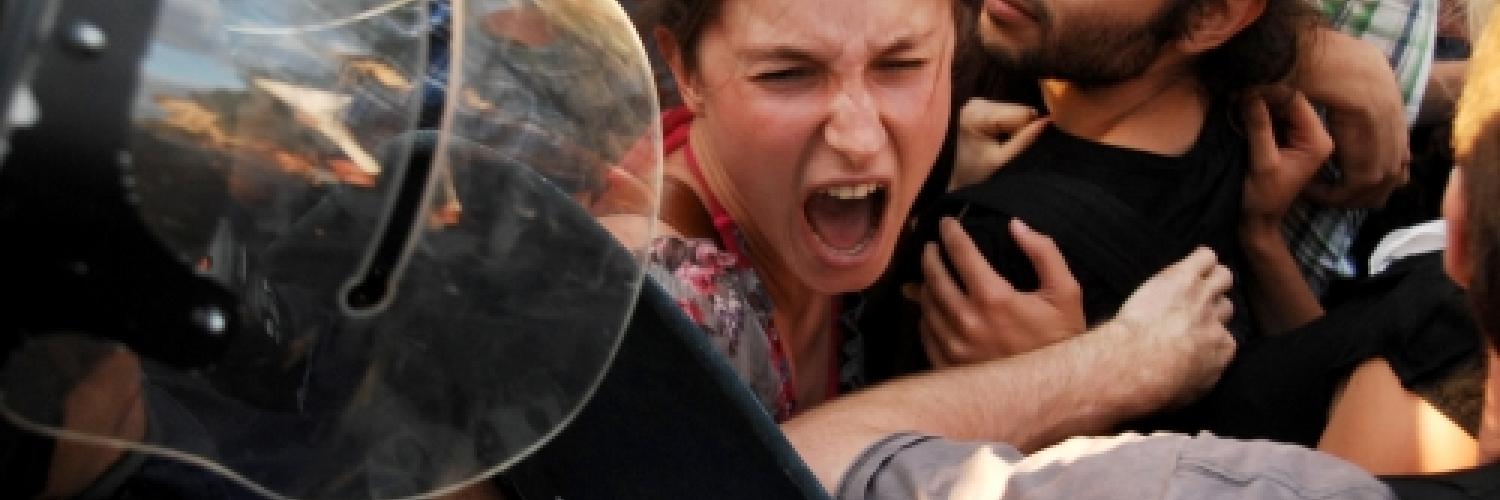What kinds of justifications do we have for deciding whether to act violently or non-violently?
Where do we draw the line between political action and violent action? How do activists justify various forms of action? And does acting politically need a different kind of justification than acting violently?
In the pursuit of social order, governments and states seek to justify, and to control, the use of force. Meanwhile, claims for justice, rights, or social change frequently lead to conflict with forces of ‘order’, and violent confrontation often results. The frontier between politics and violence is one of the most pressing political problems of our time, both within states and internationally.
Many people draw a line between politics and violence – we talk of a group laying down their arms, and entering into a political process. But it is not that simple. For some people, armed struggle is part of the political process, and justifiable for political ends. There is also a grey area when non-violent action can be considered as violent – where it is used in a way which is somehow aggressive, or when it provokes violence in others.
This project conducted fieldwork in Florence, Italy, to ask current political activists about thier understandings of the politics violence frontier. What kinds of actions may we engage in, and what kinds of justifications do we have for deciding to act violently or non-violently. Initial fieldwork has taken place in Italy. The project is now conducting initial analysis, and aims to design a larger comparative study of the politics-violence frontier across a range of cases of political activism in Northern and Southern Europe.
External Partners
Professor Kimberly Hutchings of Queen Mary University of London is the project's co-principal investigator. She is the author of several books, including most recently Time and World Politics: thinking the present (2008) and Global Ethics: an introduction (2010).
Project Outputs
Publications
Elizabeth Frazer and Kimberly Hutchings, “Drawing the Line Between Violence and Non-Violence: deceits and conceits” in Christine Sylvester (ed) Masquerades of War (Abingdon and New York, Routledge, 2015).
The Politics-Violence Frontier, forthcoming 2019 Journal of Political Ideologies.
Elizabeth Frazer and Kimberly Hutchings, “Drawing the Line Between Violence and Non-Violence: deceits and conceits” in Christine Sylvester (ed) Masquerades of War (Abingdon and New York, Routledge, 2015).
Elizabeth Frazer and Kimberly Hutchings, “Feminism and the Critique of Violence: negotiating feminist political agency”, Journal of Political Ideologies 19 (2) 2014: 143-163.
Elizabeth Frazer and Kimberly Hutchings, “Revisiting Ruddick: Feminism, pacifism and non-violence”, Journal of International Political Theory. 10 (1) 2014: 109-124.
Public Lectures
‘Reflections on Politics and Violence’ Public Lecture given at Westminster University https://www.youtube.com/watch?v=500fVWXOrWs
Interviews
‘Gendered Violence in Conflict’ interview with Katherine Millar and Elizabeth Frazer
https://www.youtube.com/watch?v=qBH8ce1_cno
E-ir Interview with Kimberly Hutchings
http://www.e-ir.info/2014/10/24/interview-kimberly-hutchings/




